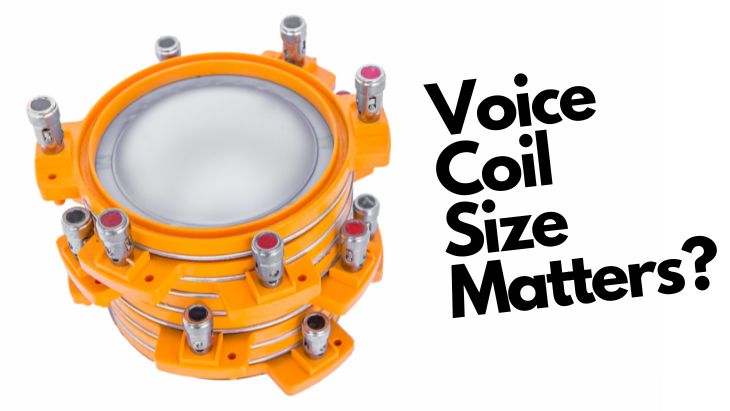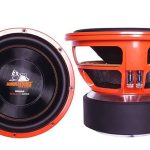When upgrading a music system with new speakers and subwoofers, you will come across speakers and subwoofers with differently-sized voice coils. A voice coil makes a huge difference in the power that a speaker or subwoofer outputs. Thus, it is a very important component of a speaker. But does voice coil size matter? In this article, we will explain the role of a voice coil and whether voice coil size matters.
What Is a Voice Coil?
A voice coil is a thin wire wrapped severally around a material known as a former. The wire is usually made of copper whereas the former is typically made of aluminum, paper, or Kapton. The voice coil is usually attached to the speaker diaphragm/cone.
To help you understand whether voice coil size matters, it will help to discuss how a voice coil works. The voice coil itself doesn’t produce any sound. It is usually positioned in a magnet assembly. Whenever current passes through the voice coil, it is triggered to move up and down within the magnet assembly. It transfers the vibrations to the attached speaker cone. The cone produces audible sound as it vibrates. Considering its role in a speaker, the voice coil can be considered the heart of a speaker.
How Voice Coil Size Affects Sound Output
The size of a voice coil varies in length and diameter. Let’s discuss voice coil length and diameter, and why they matter.
i. Voice coil length
When bass frequencies pass through the voice coil, it has to vibrate further than higher frequencies, especially at higher power. As the coil moves, the percentage of the voice coil sitting in the magnet assembly gap should remain constant. To achieve a constant gap, the voice coil may be designed to be long with a thin pole plate, or the voice coil may be designed to be short with a thick pole plate.
ii. Voice coil diameter
With the diameter constant, a speaker with a smaller voice coil will have less control over the movement of the cone than a larger voice call. A smaller voice coil allows the speaker cone to be more resonant than a larger voice coil of the same diameter.
While some speakers with a small voice coil may appear more efficient, the extra efficiency is often on a specific resonant bass note. Any frequencies beyond that resonant bass note make the speaker less efficient than a speaker with a larger voice coil, even if the diameter is similar.
Does Voice Coil Size Matter?
Yes, it does. A larger voice coil has better control over the speaker cone than a smaller coil. It has greater power handling. Also, a larger voice coil improves linearity and damping. However, larger voice coils are more expensive to make. Assembling speakers with larger voice coils is more challenging as it requires a larger magnetic gap. This calls for a larger magnet structure.
Single Voice Coil Vs Dual Voice Coil
A single voice coil, simply SCV), is one in which only one length of wire is wrapped around the speaker former. On the other hand, a dual voice coil, simply DVC, is one in which there are two coils of wire that are wrapped around the speaker former.
Single voice coils have one negative and positive terminal. On the other hand, DVCs have two negative terminals and two positive terminals, one pair for each voice coil. Essentially, the extra coil of a DVC makes it more expensive than a SVC.
Although a DVC has two coils, it may offer the same performance as a speaker with a SVC of the same quality and size. However, a DVC offers more flexibility and wiring options. For instance, you can only wire a SVC subwoofer at only one specific ohm level. On the other hand, a DVC subwoofer can be wired at different ohm levels.
3 inch vs 4 inch voice coil
When comparing a 3 vs 4 inch voice coil, it is worth noting that a 4 inch voice coil is larger than a 3 inch coil. Thus, a 4 inch voice coil has better power handling.
Final Thoughts
Does voice coil size matter? Is a bigger voice coil better? Yes, a larger voice coil results in better power handling, hence louder sound output than a smaller voice coil. The disadvantage of a larger voice coil is that it gets hotter and is more expensive to build.
Speakers with larger voice coils require more venting for enhanced cooling. If a speaker overheats, its components will degrade over time. Overall, a larger voice coil may not always mean the speaker is better. If it is built with low-quality materials, it will not perform better than a well-built speaker with a smaller voice coil.
Michael Evanchuk is a San Francisco-based sound engineer with 20 years’ experience installing, troubleshooting, and repairing commercial, automotive, and household sound equipment. Evanchuk owns an auto stereo center, where he offers highly competitive car audio installation and repair services. He has written dozens of articles on different sound engineering topics, all of which have been published in leading journals, blogs, and websites.





